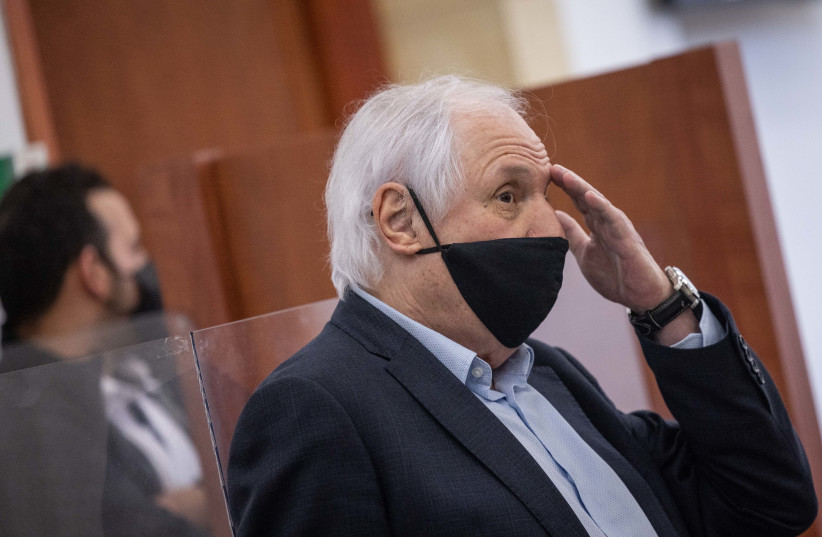In some ways, the fate of former prime minister Benjamin Netanyahu and the balance of power for the entire Israeli political system comes down to a meeting with Shlomo Filber shortly after June 7, 2015.
Did Netanyahu hatch the Bezeq bribery scheme which is at the heart of Case 4000 in that meeting?
It was the meeting that finally flipped former attorney-general Avichai Mandelblit from a wall protecting Netanyahu, to deciding to turn on his former boss and sponsor and indict him for bribery.
On Wednesday, the prosecution landed key punches with precision that could certainly lead to Netanyahu’s conviction.
Filber provided the key evidence, being the only prosecution witness who can say – and in fact did testify – that Netanyahu gave him three specific orders to help Shaul Elovitch’s Bezeq. That help eventually benefited Elovitch to the tune of NIS 1.8 billion, despite criticism from professional government experts.

Filber also connected the dots between himself, Netanyahu, and former Communications Ministry chief of staff and Netanyahu loyalist Eitan Tzafrir, who gave Filber more specific dates and orders on how to please Elovitch.
That is only part of what happened in court on Wednesday.
Three times Filber departed from his previous testimony, which could end up becoming an escape hatch for Netanyahu to obtain an acquittal despite the charges.
The three deviations seemed to be carefully constructed to both abide by his plea deal, in which he cannot contradict earlier testimony, yet also try to help Netanyahu by adding some new points that dilute the charges.
First, he said that Netanyahu had put more emphasis on helping Elovitch cope with attempts to reform the telecommunications sector in a way that would enhance competition – as opposed to the Bezeq-YES merger, which he said was secondary.
Although Filber did not backtrack from saying Netanyahu pressed him to get the Bezeq-YES merger approved, his creating a hierarchy in which this was less important could water down the prosecution’s narrative – which maintains that it was the most critical element.
Second, Filber said that when Netanyahu gave him the orders to please Bezeq, his emphasis was on Bezeq’s policies, as opposed to pleasing Elovitch.
This change could prove disastrous to the prosecution, as Netanyahu’s main defense is that he believed the policies that helped Elovitch were also the right policies, despite objections from the government professional echelon.
When prosecutor Yehudit Tirosh offered up a veiled threat that such an answer might violate his plea deal, Filber backed off.
With his voice shaking and appearing suddenly nervous, Filber affirmed his earlier response to the police saying that Netanyahu’s emphasis was on pleasing Elovitch, regardless of the specific policy.
However, having to threaten Filber in front of the judges to get him to give the desired answer could carry a price when they ponder whether he is speaking freely or under duress.
Third, and most importantly, Filber added reasons to his motivations for advancing Bezeq policies besides pleasing Netanyahu.
True, he carefully avoided contradicting his earlier testimony to police that one motivation for helping Bezeq was to please Netanyahu. And in affirming that pleasing Netanyahu was one motivation, Filber again skirted violating his plea deal that could otherwise land him in jail.
But he added two new reasons for his actions that could dilute the prosecution’s case and provide Netanyahu with an alibi.
Filber essentially said that he also helped Bezeq to advance his own personal success; and because aspects of helping Bezeq made sense on a policy level.
Indirectly, Filber framed as valid the narrative that Netanyahu believed the policies helping Elovitch and Bezeq were also good policy, even against the government experts’ advice.
For the prosecution to win, it is not enough to prove their theory of the case. They also need to pretty much prove that any defense alibi is ridiculous and not believable.
Filber made other narrative contradictions, which could provide some ammunition for the defense to try to undermine his credibility.
But the net result of Wednesday’s testimony is still a win for the prosecution, as they got Filber to not recant any major element of the prosecution’s case against Netanyahu.
In this way, Wednesday may later be looked upon as the day Netanyahu’s conviction was sealed.
However, Filber’s departures from the script could create enough doubt in the minds of the judges for Netanyahu to come out exonerated.
